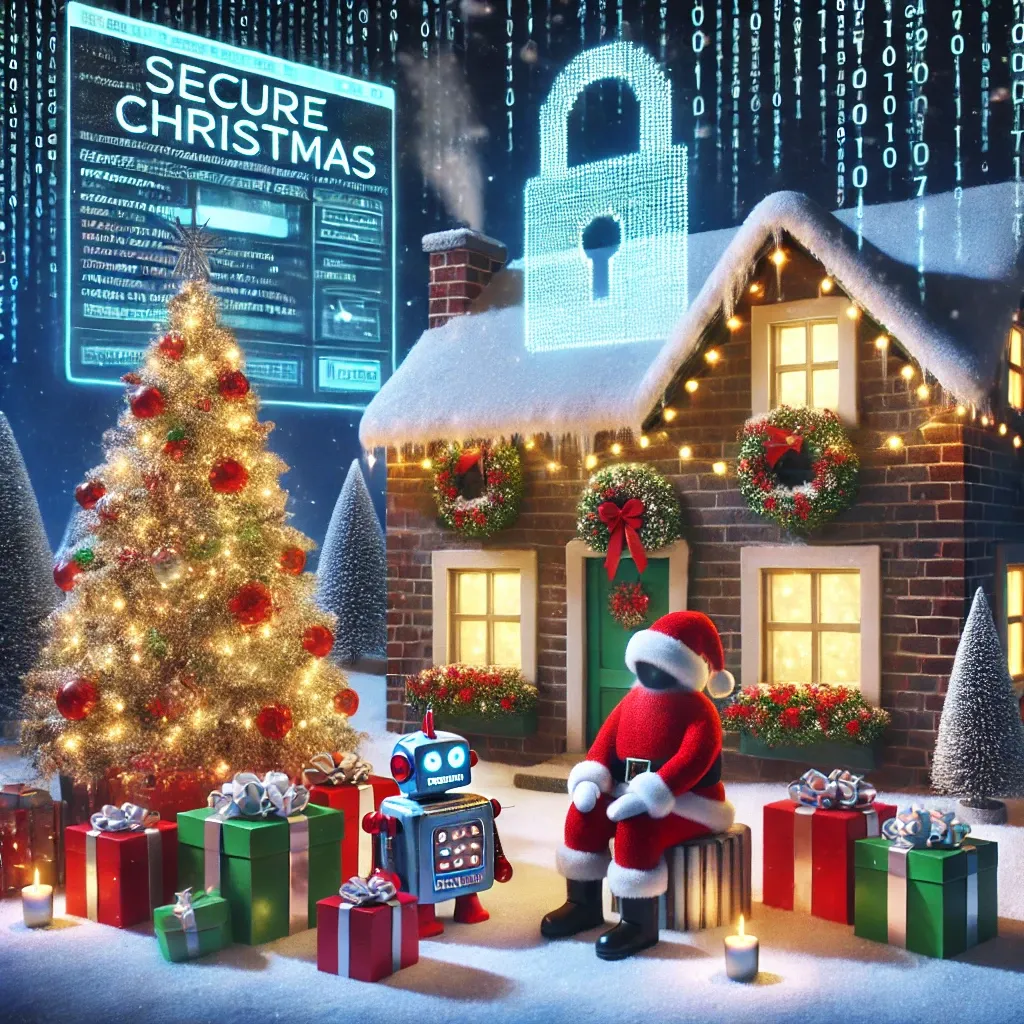A Very Merry Cyber-Christmas: The Dark Side of the Holiday Spirit

Christmas has always been a time of paradoxes. It’s the season when we bring trees indoors and drape them in lights, when we voluntarily subject ourselves to Mariah Carey’s greatest hits on repeat, and when we splurge on gifts to bring joy to others while quietly wondering if our credit card statements will bring us to tears come January. But there’s another paradox at play, one that’s less talked about yet increasingly insidious: the season of goodwill and cheer has become a prime target for cybercriminals.
Yes, while you’re busy roasting chestnuts, wrapping presents, and fending off relatives’ questions about your life choices, hackers are plotting their own holiday traditions—ones involving phishing emails, ransomware attacks, and, occasionally, the complete collapse of your online shopping spree.
The Ghosts of Cyber-Christmas Past
To truly appreciate the extent of cyber mischief that occurs during the festive season, we need to don our virtual Santa hats and take a trip down memory lane. Consider Christmas 2014, when millions of gamers found themselves unable to access their new PlayStation and Xbox consoles, not because of technical glitches but because of a well-coordinated cyberattack by a group charmingly named “Lizard Squad.” Yes, nothing says “Merry Christmas” like spending hours trying to explain to your teary-eyed teenager why they can’t play FIFA.
Then there’s the infamous Target data breach of 2013, a holiday fiasco that affected over 40 million customers. Hackers infiltrated the retailer’s payment systems, stealing credit card information faster than you can say “Black Friday sale.” Shoppers didn’t just leave the store with their Christmas gifts—they left with a side of financial anxiety that lingered well into the new year.
And who could forget the 2015 Ukrainian power grid attack? While not Christmas-specific, the timing was particularly cruel: a meticulously planned hack left entire regions in the dark during the holiday season. It was a stark reminder that cyberattacks are not just about stolen data—they can disrupt lives in profoundly unsettling ways.
Why Christmas?
You might wonder: why do cybercriminals seem to have a particular fondness for Christmas? The answer lies in the perfect storm of human behavior and technological vulnerability that the holiday season creates.
For starters, we’re distracted. Between shopping, traveling, and pretending to enjoy eggnog, we’re less vigilant about things like secure passwords or scrutinizing the legitimacy of an email from “Santa’s Workshop” promising exclusive discounts. Cybercriminals, ever the opportunists, exploit this distraction to launch phishing scams and malware attacks with devastating effectiveness.
Then there’s the sheer volume of online activity. Christmas has become a digital extravaganza, with millions of people shopping, booking travel, and streaming holiday movies all at once. This flurry of online transactions provides hackers with a treasure trove of targets, from poorly secured payment gateways to unsuspecting consumers.
The Tools of the Trade
The ingenuity of holiday-themed cyber scams is almost admirable—if it weren’t so diabolical. Consider the rise of fake e-commerce sites that promise jaw-dropping deals on popular gifts. You think you’re buying a discounted pair of AirPods, only to discover you’ve handed over your credit card information to a faceless scammer in a far-off land.
Ransomware attacks are another festive favorite. Picture this: it’s Christmas morning, and instead of unwrapping presents, you’re greeted with a message on your computer demanding Bitcoin to regain access to your family photos or that year’s tax documents. Ho, ho, no!
Even social media isn’t safe. Scammers create fake charity pages, tugging at your heartstrings with stories of families in need, only to pocket the donations for themselves. It’s a modern twist on Ebenezer Scrooge—except this time, the money doesn’t stay in the counting house; it disappears into the ether of the dark web.
The Ghosts of Cyber-Christmas Yet to Come
As technology evolves, so do the methods of cybercriminals. The rise of artificial intelligence and machine learning has given hackers new tools to craft more convincing scams, from hyper-personalized phishing emails to deepfake videos of CEOs asking for urgent wire transfers (a rather unorthodox Christmas bonus request, if you ask me).
And then there’s the Internet of Things. As our homes fill up with smart speakers, connected thermostats, and Wi-Fi-enabled coffee makers, we’re inadvertently creating new entry points for cyberattacks. Imagine waking up on Christmas morning to find your smart fridge has been hacked and is holding your eggnog hostage.
Staying Safe in a Digital Winter Wonderland
But it’s not all doom and gloom. Just as Ebenezer Scrooge found redemption, so too can we find ways to protect ourselves from the ghosts of cyber-Christmas.
Start by practicing good cyber hygiene: use strong, unique passwords (and a password manager if you must), enable two-factor authentication, and think twice before clicking on links that seem too good to be true. Be especially cautious with emails claiming to be from retailers or delivery services; if in doubt, go directly to the company’s website to verify the information.
Keep your devices updated, because nothing says “holiday cheer” like a freshly patched operating system. And for the love of all things merry, avoid public Wi-Fi when shopping or banking online. If you must connect, use a VPN to keep prying eyes at bay.
Finally, remember the true spirit of the season: generosity, connection, and, most importantly, skepticism. Question the legitimacy of online offers, scrutinize charitable solicitations, and teach your family members (yes, even Uncle Frank) how to spot a scam.
The Final Thought
Christmas, for all its joy and chaos, is a time to celebrate what matters most: family, friends, and the quiet comfort of knowing your credit card hasn’t been maxed out by a hacker in Moldova. While cybercriminals may never take a holiday, neither should our vigilance. So this year, let’s unwrap our presents with one hand and secure our digital lives with the other. Because nothing says “Merry Christmas” like peace of mind—and maybe, just maybe, a little less Mariah Carey.
Comments ()